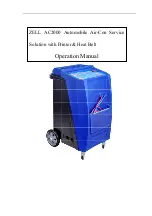
Installation
July 2018
4-34
06-237518-001
4-17
POST-INSTALLATION PROCEDURES
After the Kidde IGS installation has been completed, perform the following inspections and
tests.
1. Verify that the cylinders of correct weight and pressure are installed in accordance with in-
stallation drawings.
2. Verify that the cylinder brackets and straps are properly installed and all fittings are tight.
3. The piping distribution system must be inspected for compliance with the system drawings,
BS EN ISO 14520, design limitations within this manual and the computerized hydraulic cal-
culations associated with each independent piping and nozzle configuration.
4. Check that the discharge manifold, discharge piping and actuation piping are securely
fixed. Ensure all fittings are tight and securely fastened to prevent Agent leakage and haz-
ardous movement during discharge. The means of pipe size reduction and installation po-
sition of the tees must be checked for conformance to the design requirements.
5. The piping distribution system during installation must be cleaned, blown free of foreign
material and inspected internally to ensure that oil or particulate matter will not soil the
hazard area or reduce the nozzle orifice area and affect Agent distribution.
6. System piping should be pressure tested in accordance with the requirements of BS EN ISO
14520.
7. Ensure that all types of check valves are installed in the proper location as indicated on the
installation drawings and that the equipment is installed with the arrow pointing in the di-
rection of flow.
8. Verify the nozzles are installed in the correct locations and have the correct part numbers
and orifice sizes as indicated on installation drawings. Ensure discharge nozzles are prop-
erly oriented. Check the nozzle orifices for any obstructions.
9. The discharge nozzles, piping and mounting brackets must be installed such that they will
not cause injury to personnel. The Agent must not be discharged at head height or below
where people in a normal work area could be injured by the discharge. The Agent must not
directly impinge on any loose objects or shelves, cabinet tops or similar surfaces where
loose objects could be propelled by the discharge.
10. For systems with a main/reserve capability, the MAIN/RESERVE switch must be clearly
identified and properly installed outside the hazard area where it is readily accessible.
11. Manual release units must also be clearly identified and properly installed where they are
readily accessible. All manual release units that activate Kidde IGS Systems should be
properly identified as to their purpose. Particular care should be taken when multiple re-
lease units exists on the same bank of containers. These release units should be clearly
identified as to the risk with which they are associated.
12. Install any remaining actuation hoses and perform the release unit test outlined in
Paragraph 6-6.6 on all cylinders equipped with release units.
Note:
All acceptance testing shall be in accordance with BS EN ISO 14520 current edition.
13. Making the system live after all system checks by installing the actuation hoses from re-
lease units to the corresponding primary cylinder actuation inlets then test the Pilot Line.
WARNING
Ensure the actuation hose is fully inserted into the release unit. There should be
a gap of no more than 1/4” (6 mm) between the end of the festo connector and
the release unit quick connect.
Summary of Contents for 400 Series
Page 2: ...Table i Revision History Revision Change Description AA Initial Release ...
Page 16: ...July 2018 xiv 06 237518 001 THIS PAGE INTENTIONALLY LEFT BLANK ...
Page 157: ...06 237518 001 A 1 July 2018 APPENDIX A SAFETY DATA SHEETS ...
Page 188: ...July 2018 A 2 06 237518 001 THIS PAGE INTENTIONALLY LEFT BLANK ...
Page 189: ......















































